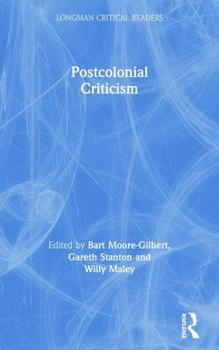Postcolonial Criticism
Select Format
Select Condition 
Book Overview
Post-colonial theory is a relatively new area in critical contemporary studies, having its foundations more Postcolonial Criticism brings together some of the most important critical writings in the field, and aims to present a clear overview of, and introduction to, one of the most exciting and rapidly developing areas of contemporary literary criticism. It charts the development of the field both historically and conceptually, from its beginnings in the early post-war period to the present day. The first phase of postcolonial criticism is recorded here in the pioneering work of thinkers like Aim C saire, Frantz Fanon, Edward Said, and Gayatri Spivak. More recently, a new generation of academics have provided fresh assessments of the interaction of class, race and gender in cultural production, and this generation is represented in the work of Aijaz Ahmad, bell hooks, Homi Bhabha, Abdul JanMohamed and David Lloyd. Topics covered include negritude, national culture, orientalism, subalternity, ambivalence, hybridity, white settler societies, gender and colonialism, culturalism, commonwealth literature, and minority discourse. The collection includes an extensive general introduction which clearly sets out the key stages, figures and debates in the field. The editors point to the variety, even conflict, within the field, but also stress connections and parallels between the various figures and debates which they identify as central to an understanding of it. The introduction is followed by a series of ten essays which have been carefully chosen to reflect both the diversity and continuity of postcolonial criticism. Each essay is supported by a short introduction which places it in context with the rest of the author's work, and identifies how its salient arguments contribute to the field as a whole. This is a field which covers many disciplines including literary theory, cultural studies, philosophy, geography, economics, history and politics. It is designed to fit into the current modular arrangement of courses, and is therefore suitable for undergraduate and postgraduate courses which address postcolonial issues and the 'new' literatures in English.
Format:Paperback
Language:English
ISBN:058223798X
ISBN13:9780582237988
Release Date:October 1997
Publisher:Routledge
Length:312 Pages
Weight:0.88 lbs.
Dimensions:0.7" x 5.5" x 8.5"
Customer Reviews
1 rating
excellent extended introduction to ten exemplary essays
Published by Thriftbooks.com User , 23 years ago
The long and admirable 70 page introduction outlines the postcolonial field of studies in as succinct and lucid a manner as possible taking special care to note that in this field there is no such thing as consensus. The fields most marked characteristic is perhaps its diversity which is not too surprising given the wide scope of historic, cultural and psychic circumstance now under its scrutiny. Excellent summaries of the primary figures in the field as well as an awareness of the provisionality of any self-definition (of both the field of study and the political reality), for as postcolonial theories evolve so do the definitions of the postcolonial.Essays: 1)Cesaire from Discourse on Colonialism 2)Fanon On National Culture 3)Achebe An Image of Africa:Racism in Conrad's Heart of Darkness 4)Said Orientalism Revisited 5)Spivak Three Womens Texts and a Critique of Imperialism 6)Bhabha Race, Time, and Revision of Modernity 7)Bryden/Tiffin West Indian Literature and the Australian Comparison 8)Bell Hooks Revolutionary Black Women:Making Ourselves Subject 9)JanMohamed/Lloyd Toward a Theory of Minority Discourse: What is to be done? 10)Ahmad from In Theory:Classes, Nations, Literatures.





